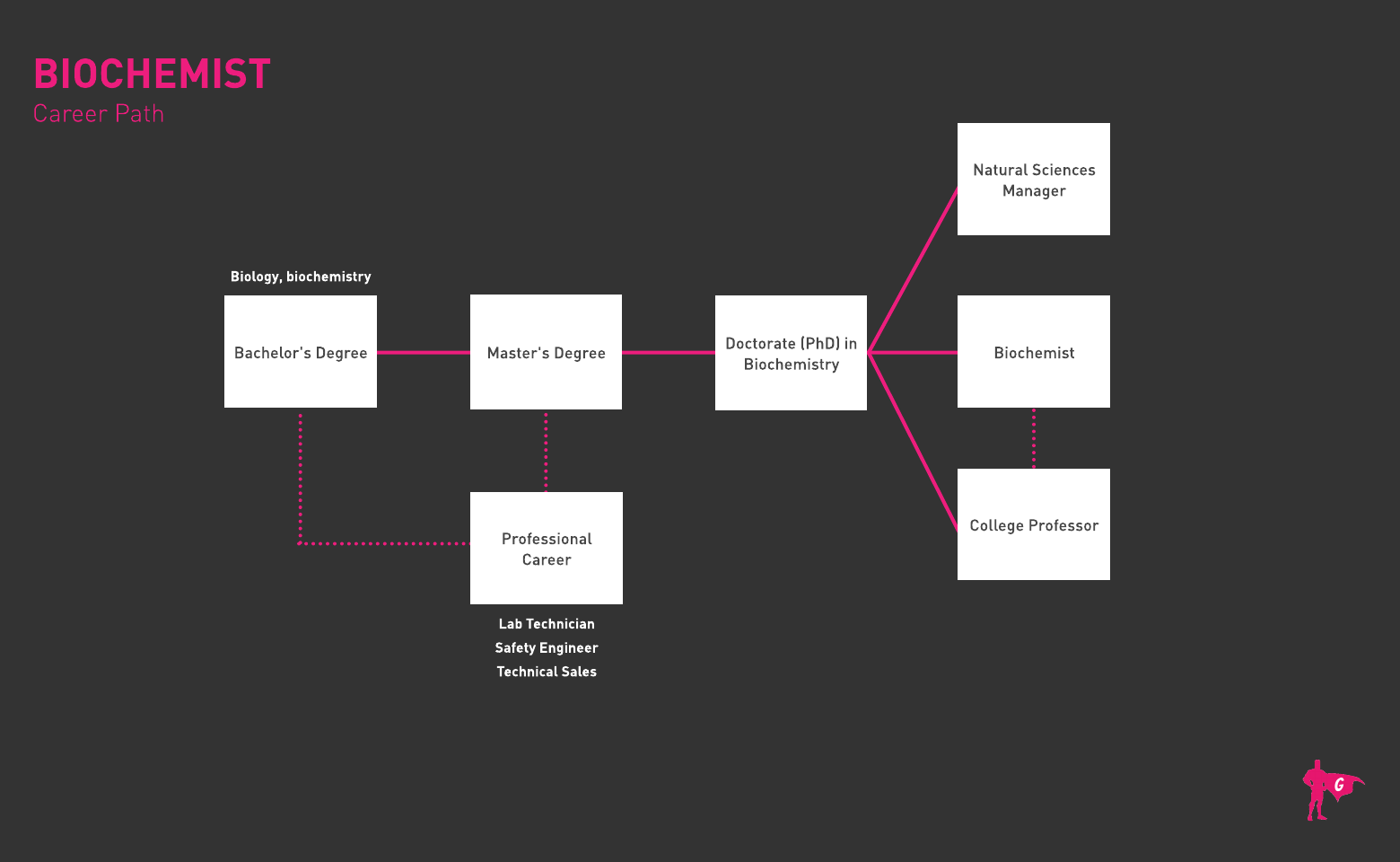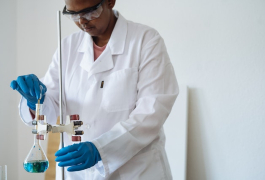Reflektory
Analytical Research Chemist, Biophysics Researcher, Scientist, Research Scientist, Molecular Biologist, Biochemical Scientist, Biotechnology Researcher, Pharmaceutical Scientist, Protein Chemist, Geneticist, Cell Biologist, Microbiologist, Bioanalytical Chemist
A biochemist studies the chemical principals of living things, as well as the processes that help living things to live. They lead a laboratory or work with a team of assistants and technicians to conduct experiments that help them learn about living things.
They may study animal biology, cell development, diseases, or other areas of biology.
Biophysicists are similar scientists, but they focus on physical principles.
- As you move up, you are able to study the things that really interest you.
- Biochemists play important roles in new technologies that benefit many people and places.
- There is always new information to learn and explore – new discoveries lead to new questions!
- Most of your co-workers are dedicated to your work, which creates strong teamwork and a good work environment
These scientists work in an office and laboratory setting. This is typically a full-time position with a Monday-Friday work schedule. You may work more hours if meeting deadlines, or if an experiment is time-sensitive.
They use technology such as computer modeling to analyze living things and their components. This might be DNA or proteins that help keep bodies healthy.
- Create and lead experiments in the lab.
- Read work done by other scientists, so you are knowledgeable about trends in your field.
- Write grants for funding, or support a grant writer in your organization.
- Write reports and papers about your experiments and submit to publishers.
- Use experiments to learn more about DNA, drug uses, creating synthetic compounds, or other biological questions.
There are two main fields of both Biochemistry and Biophysics: Basic Research and Applied Research.
Basic Research is concerned with learning for learning’s sake. They want to improve the level of knowledge humans have. These scientists will often work for public universities or colleges. The questions being answered by the research are created by the scientist.
Applied Research answers specific questions. It is often used to produce products. These can help a farmer with their crops, a new treatment for a disease, or even finding faster ways to create biofuels – fuel made from plants. The questions the scientist is trying to answer is assigned by a company or other private entity.
SOFT SKILLS
- Able to communicate orally, but more emphasis on written communication
- Logical reasoning – able to figure an answer out by using available data, without being told a specific answer.
- Creativity – able to look at problems in new ways.
- Active learning and a strong desire to learn more
- Strong questioning skills
TECHNICAL SKILLS
- Strong computer skills – scientific software and graphic imaging software such as Adobe Photoshop
- Database and spreadsheet knowledge
- Intermediate computer programming skills are needed – Python and Perl
- Pharmaceutical/Medical Manufacturing
- Colleges/Universities or other school settings
- Technical Consulting Services – Helping companies sell their products
Becoming a biochemist means earning a Ph.D. This means you will be in school for six years before you even start your Ph.D.! Doctorate programs for biochemistry take four to six years. This means you could attend school for almost twelve years.
After earning your doctorate, it will likely take you up to two years before you find a permanent job. You will need to work and support your education during this time – it can take almost 14 years to become a Biochemist.
- As a science, Biochemistry is always evolving. Some trends evolving:
- Using 3D modelling to explore DNA and organisms
- Identifying gene therapies for disease and other health problems
- Exploring biological based solutions for environmental problems.
- Exploring anatomy and the inner workings of organisms
- Biochemists often loved science classes as kids
- Asking a lot of questions about everything – especially “How?” and “Why?” questions.
- Biochemists often hold PhDs after completing a bachelor’s and master’s in biochemistry, biology, physical science, or sometimes even engineering
- Common courses include math, physics, biological science, chemical science, toxicology, genetics, proteomics, bioinformatics, and plenty of lab research
- Per O*Net Online, 25% of workers in this field only have a bachelor’s, 25% have a PhD, and 40% have some post-doc training
- Post-doc training may occur while working in research jobs, for example at universities
- Lab experience is critical and obtained via college programs plus internships
- Licensure and certification aren’t required for Biochemists in general; however, some positions may require certification in a specialized area
- The American Society for Biochemistry and Molecular Biology (ASBMB) accredits bachelor’s degree programs in biochemistry and molecular biology
- Students in ASBMB-accredited programs can opt to take the ASBMB certification exam
- The exam features 12 mainly free response questions, is offered online, and can only be attempted once during a student’s undergrad career
- Start your long educational journey with a solid foundation in biology, math, and chemistry
- Gain lab experience through paid internships
- Decide which type of Biochemistry you’ll want to specialize in, such as structural biology, enzymology, and metabolism
- Think about which career field you might be interested in, such as medical and biotechnological research, pharmacology, genetic research, or military research
- Join professional organizations to learn, grow, and network (see our Recommended Resources > Websites for a list of options)

- Roughly 11% of Biochemists work in the areas of pharmaceuticals and medicine manufacturing; 7% work at colleges or universities
- BLS projects increased job opportunities in certain areas such as biomedical research, biotech R&D, energy, food production, and environmental protection
- Ensure you have the appropriate mix of academic credentials, laboratory experience, applicable certifications, and relevant work experience for the jobs you apply to
- Biochemist internships are a great way to get experience in the field
- Check out popular job portals such as Indeed, Simply Hired, Glassdoor, and Zippia for openings
- Consider reviewing the career pages on websites for top companies such as Amgen, Gilead Sciences, Celgene, Biogen, Vertex, Illumina, Regeneron, Alexion, BioMarin, and Agilent Technologies
- Stay active with professional organizations. Attend conferences, make connections, and let your network know when you’re looking for a new job
- Review Monster’s entry-level Biochemist resume templates to get ideas for wording and formats
- Study Biochemist interview questions to prepare for job interviews!
Strony internetowe
- American Association for Cancer Research
- American Association for the Advancement of Science
- American Chemical Society
- American Institute of Biological Sciences
- American Institute of Chemical Engineers
- American Society for Biochemistry and Molecular Biology
- American Society for Cell Biology
- American Society for Clinical Pathology
- American Society for Mass Spectrometry
- Federation of American Societies for Experimental Biology
- International Union for Pure and Applied Biophysics
- National Institutes of Health
Książki
Bachelor’s/Master’s
- Environmental Chemist
- Chemical Safety Engineer
- Lab Technician
- Research Associate
- Technical Sales – Helping develop and sell specific products
- Wildlife Biologist
Ph. D (Doctor of Biochemistry)
- College/University Teacher or Professor
- Scientist in similar field such as Forensics or Agriculture
- Biomedical Engineer – Developing research into useful equipment
- Microbiologist
- Natural Science Manager – supervising the work of a group of scientists
Biochemistry (and Biophysics) is a very challenging career. There are many years of school to work through, and the classes are often difficult. However, you are able to find a similar career after your Bachelor’s degree. You may find a need to take a break from school for a few years between degrees.
However, people who complete this career path and obtain their Doctorate are able to help many people with their research. There is a strong sense of pride linked to completing such challenging coursework, and they are able to work daily exploring questions they are passionate about.
Kanał informacyjny

Polecane oferty pracy

Kursy i narzędzia online








